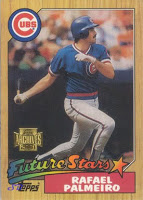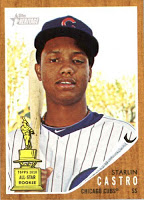Last night, I wrote a post about the trade rumors that surround Starlin Castro. The post was informative with very little opinion. I am usually very opinionated when it comes to the Chicago Cubs. I have been a fan since I was old enough to understand what the hell Harry Caray was saying. I didn’t add much opinion because I was shocked that two high-ranking members of the Cubs organization would tell USA Today’s Bob Nightengale that “everyone but Jeff Samardzija is available.”
Epstein refuted that statement late Thursday to The Sporting News by saying, “Starlin Castro is the type of player we’re looking to build around. There has been no trade consideration with him, whatsoever.”
Epstein’s statement is “sports speak” and politically correct. This is coming from an executive who once traded Nomar Garciaparra in the middle of a pennant race.
I want to point out the similarities to Starlin Castro and Rafael Palmeiro, who the Cubs traded to the Texas Rangers in 1988 when he was a 23-year old. The Cubs received a package of six young prospects. Did I mention the Cubs also traded Jamie Moyer away in the same deal?
There is no doubt that Epstein has an itchy trigger finger. He wants to show Cubs fans that he is there to win.
If Starlin Castro is traded, could he be a part of the next Rafael Palmeiro trade disaster?
Let’s take a look at the organization similarities in 1987-88 and 2011-12.
1987-88: The Cubs fired Dallas Green as the general manager and hired Jim Frey to take over the job. Frey previously worked in the Baltimore, Kansas City, and New York Mets organizations. He even worked under Green as the Cubs manager from 1984-86. He was not married to any player in the organization, especially Moyer and Palmeiro, who both made their professional debuts in ’86…after Frey was fired.
2011-12: Jim Hendry, who had a great beginning to his GM tenure in 2003, fell short in his last few years on the job. After he fired Dusty Baker, he hired Lou Piniella as the team’s savior. He couldn’t do much with the talent. Expectations began to lower and fan frustration was on the rise. Hendry was finally fired after the 2011 season. The Cubs hired former Boston Red Sox’s executive, Theo Epstein as the President of Baseball Operations. He then hired former San Diego Padres GM Jed Hoyer to take over the same position with the Cubs. Neither Epstein or Hoyer have any ties to young talent and/or the veterans on the 25-man roster.
The Cubs situation in both eras are parallel. A change in the front office and the desire to blow up the team and start fresh. Frey was already quite familiar with the Cubs organization. You would think that he would have tried to hold onto Palmeiro and Moyer, but Green acquired those players. Green was the GM who fired Frey and on a personal level, it could have swayed his decision to rid the team of some talent and get back younger players that could help the team in the future. He would get all of the credit for the turnaround.
Let’s take a look at Rafael Palmeiro in 1986-88 and Starlin Castro in 2010-12.
Rafael Palmeiro in 1986-88: He was drafted in the first round of the 1985 amateur draft by the Chicago Cubs. He came up for a short time at the end of the 1986 season and showed plate discipline and a little pop. He was called up in June of 1987 and hit 14 home runs in only 221 at-bats. It was the first sign of his power numbers that he would later hit in his career. He came into the 1988 season as the starting left-fielder and played a little at first base. He hit .307 with eight home runs in 580 at-bats. His power numbers were down but he only struck out 34 times in 152 games. Palmeiro was showing all of his tools, but he only had four. His defense was a glaring hole in his game…the reason Frey used when he traded him in December of 1988.
Starlin Castro in 2010-12: He signed as an amateur free agent in 2006. He played 125 games in 2010 with a line of 3/41/.300. He finished fifth in the Rookie of the Year voting. In 2011, he came into his own and earned his first All-Star selection. He finished the year with a line of 10/66/.307 and had some votes for NL Most Valuable Player. He led the National League in hits with 207 in 2011. So far in 2012, he has a line of 4/32/.317 in 205 at-bats. He has the same questions about his defensive ability as Palmeiro had at the same point in their careers. He committed a total of 56 combined through 2010-11 and has already has 9 errors through the first 50 games in 2012.
If we go back to Nightengale’s piece in the USA Today, the top ranking Cubs official said they would move Castro for “two impact prospects.” I argued that he is only 22-years old and the impact free agents would be roughly his age with less MLB experience and a lower talent-ceiling.
Let’s look at what GM Jim Frey got in return for Moyer, Palmeiro and pitcher Jim Hall in 1988.
The Cubs got back minor leaguers Luis Benitez and Pablo Delgado, pitchers Paul Kilgus, Mitch Williams, Steve Wilson and IF Curtis Wilkerson. At the time, they thought that their return on Moyer and Palmeiro was tremendous. Chicago had a lot of holes and Frey believed they would be a very talented team in the near future.
The pitchers in the deal, Kilgus, Williams and Wilson, were a combined 21-35 during their tenure with the team. Williams was an All-Star in 1989, but began to earn his “Wild Thing” nickname by becoming more unreliable in 1990. The Cubs traded him to the Phillies in 1991 for pitchers Chuck McElroy and Bob Scanlan…both of whom had longer tenures with the Cubs than any pitcher received in the Moyer/Palmeiro deal.
Benitez, Delgado and Wilkerson, the position players in the trade, contributed less than the pitchers. Benitez and Delgado never made it to the Majors with Chicago or any team for that matter. Wilkerson served as a utility player for two seasons. He only contributed one home run and a batting average that hovered near the Mendoza line.
Scouting has advanced greatly since 1988 and the odds of making such a terrible trade is lower. I just wanted to point out the dangers in trading young stars who have had early success in their careers.
Moyer had a winning record in his first season with the Cubs and went on to have a great career. He didn’t pan out for the Rangers during his time with the team, but really began to dominate at the age of 34 with Seattle.
Palmeiro went on to hit 569 homers and over 3,000 hits in his career. He spent the remainder of his career with the Texas Rangers and Baltimore Orioles. He was suspended at the end of his career for a failed drug test after he testified in front of the U.S. Congress. His career will now be looked at as a result of performance-enhancing drugs.
Starlin Castro has all of the tools that Palmeiro possessed as a 22-year old. The power numbers may not be there or will ever be there, but he is one of the best young talents in the game. Now is not the time to trade him in hopes that the young prospects they would get in return, would turn into…well, Starlin Castro clones?!
Even though Epstein put out the fire by saying that he wasn’t currently shopping Castro, be aware of a statement that he made earlier in the week.
“I never understood why there would ever be an untouchable. All you’re doing is limiting your opportunity”
Brace yourselves Cubs fans, it could be a very long summer. ![]()


